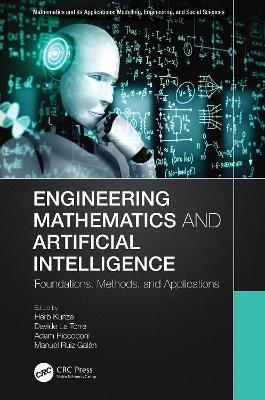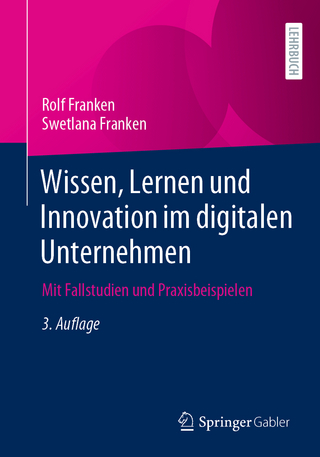
Engineering Mathematics and Artificial Intelligence
CRC Press (Verlag)
978-1-032-25568-2 (ISBN)
The fields of Artificial Intelligence (AI) and Machine Learning (ML) have grown dramatically in recent years, with an increasingly impressive spectrum of successful applications. This book represents a key reference for anybody interested in the intersection between mathematics and AI/ML and provides an overview of the current research streams.
Engineering Mathematics and Artificial Intelligence: Foundations, Methods, and Applications discusses the theory behind ML and shows how mathematics can be used in AI. The book illustrates how to improve existing algorithms by using advanced mathematics and offers cutting-edge AI technologies. The book goes on to discuss how ML can support mathematical modeling and how to simulate data by using artificial neural networks. Future integration between ML and complex mathematical techniques is also highlighted within the book.
This book is written for researchers, practitioners, engineers, and AI consultants.
Herb Kunze is a Professor of Mathematics at the University of Guelph, in Guelph, Ontario, Canada. He received his Ph.D. in Applied Mathematics from the University of Waterloo in 1997. He has held research funding from the Natural Sciences and Engineering Research Council (NSERC) throughout his career. Among his research interests are fractal-based methods in analysis, including a wide array of both direct and inverse problems; neural networks and artificial intelligence; mathematical imaging; and qualitative properties of differential equations. His work combines rigorous theoretical elements with application-driven considerations. He has over 100 research publications, generally in high-impact, refereed journals. Davide La Torre is an Applied Mathematician, Researcher, and University Professor. Currently he holds the position of Full Professor and Director of the SKEMA Institute for Artificial Intelligence. He is also the Head of the (Programme Grande Ecole) Finance and Quants track. His research and teaching interests include Artificial Intelligence and Machine Learning for Business, Business and Industrial Analytics, Economic Dynamics, Mathematical and Statistical Modeling, Operations Management, Operations Research, and Portfolio Management. He holds a master’s in Applied and Industrial Mathematics (1997, magna cum laude) and a Ph.D. in Computational Mathematics and Operations Research (2002) both from the University of Milan, Milan, Italy, and an HDR in Applied Mathematics from the Université Côte d'Azur (2021). He also holds professional certificates in Big Data and Analytics (2017), Machine Learning, and Quantum Computing (2021) from the Massachusetts Institute of Technology, Cambridge, USA. In the past, he held permanent and visiting university professor positions in Europe, Canada, the Middle East, Central Asia, and Australia. He also served as Departmental Chair and Program Head at several universities. He has more than 150 publications in Scopus, most of them published journals ranging from Engineering to Business. Adam Riccoboni is an AI entrepreneur, an author, and the CEO of Critical Future, a technology and strategy consultancy, trusted by some of the world’s biggest brands, with a strong record in pioneering AI development. He is an Award-winning entrepreneur, the founder of high-growth businesses, as featured in the Financial Times, ESPN, BBC, USA Today. He is also a Guest Lecturer on Artificial Intelligence at ESCP, UK Business School. Manuel Ruiz Galán received his Ph. D, from the University of Granada, Spain in 1999. He is a Full Professor in the Mathematics Department at the University of Granada, Spain with more than 50 research papers and book chapters to his credit. Dr. Galán has been a member and principal investigator in several projects with national funds (Spanish Government), particularly on topics focusing on convex and numerical analysis and their applications. He has acted as a guest editor for some special issues of the journal Optimization and Engineering, Mathematical Problems in Engineering, and the Journal of Function Spaces and Applications. In addition, he is a member of the editorial board of the publication Minimax Inequalities and its Applications.
1. Multiobjective Optimization: An Overview. 2. Inverse Problems. 3. Decision Tree for Classification and Forecasting. 4. A Review of Choice Topics in Quantum Computing and Some Connections with Machine Learning. 5. Sparse Models for Machine Learning. 6. Interpretability in Machine Learning. 7. Big Data: Concepts, Techniques, and Considerations. 8. A Machine of Many Faces: On the Issue of Interface in Artificial Intelligence and Tools from User Experience. 9. Artificial Intelligence Technologies and Platforms. 10. Artificial Neural Networks. 11. Multicriteria Optimization in Deep Learning. 12. Natural Language Processing: Current Methods and Challenges. 13. AI and Imaging in Remote Sensing. 14. AI in Agriculture. 15. AI and Cancer Imaging. 16. AI in Ecommerce: From Amazon and TikTok, GPT-3 and LaMDA, to the Metaverse and Beyond. 17. The Difficulties of Clinical NLP. 18. Inclusive Green Growth in OECD Countries: Insight from The Lasso Regularization and Inferential Techniques. 19. Quality Assessment of Medical Images. 20. Securing Machine Learning Models: Notions and Open Issues.
| Erscheinungsdatum | 11.07.2023 |
|---|---|
| Reihe/Serie | Mathematics and its Applications |
| Zusatzinfo | 21 Tables, black and white; 82 Line drawings, black and white; 64 Halftones, black and white; 146 Illustrations, black and white |
| Verlagsort | London |
| Sprache | englisch |
| Maße | 156 x 234 mm |
| Gewicht | 979 g |
| Themenwelt | Kunst / Musik / Theater ► Design / Innenarchitektur / Mode |
| Technik ► Elektrotechnik / Energietechnik | |
| Wirtschaft ► Betriebswirtschaft / Management ► Unternehmensführung / Management | |
| ISBN-10 | 1-032-25568-4 / 1032255684 |
| ISBN-13 | 978-1-032-25568-2 / 9781032255682 |
| Zustand | Neuware |
| Informationen gemäß Produktsicherheitsverordnung (GPSR) | |
| Haben Sie eine Frage zum Produkt? |
aus dem Bereich


